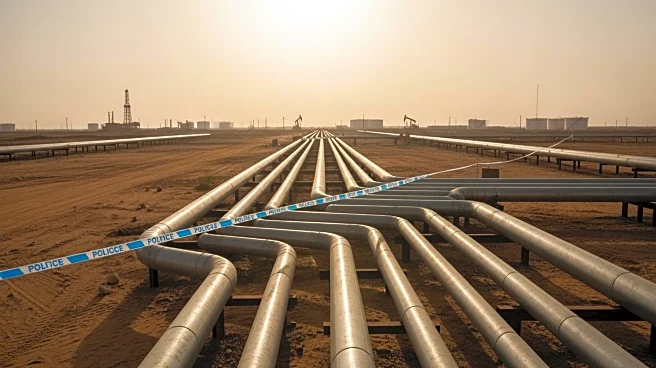What's Happening?
Africa's oil and gas sector is losing billions in potential revenue due to chronic infrastructure gaps, according to a report by Deloitte. The lack of pipelines, refineries, storage facilities, and transport networks is hindering the monetization of Africa's abundant
oil and gas resources. Countries like Nigeria and Angola face widespread infrastructure challenges, leading to production delays and higher operating costs. Deloitte identifies five main challenges: constrained access to funding, a persistent cost premium effect, ongoing security threats, limited regulatory collaboration, and insufficient enabling infrastructure.
Why It's Important?
The infrastructure deficiencies in Africa's oil and gas sector have significant economic implications. Without adequate infrastructure, the continent risks missing out on the benefits of rising global demand for oil and gas. The lack of investment in midstream and downstream infrastructure limits the ability to capitalize on hydrocarbon resources, affecting economic growth and development. The report highlights the need for coordinated investment and regulatory reforms to unlock Africa's full potential, emphasizing the importance of infrastructure as the backbone of the energy value chain.
What's Next?
To address these challenges, African governments must prioritize long-term infrastructure development alongside exploration and production. Deepening regulatory reforms, promoting fiscal transparency, and aligning investment incentives with global standards are crucial steps. Building regional partnerships to share critical infrastructure and mitigate security threats can also enhance the sector's prospects. Without these efforts, Africa may continue to struggle with infrastructure-related losses, impacting its ability to compete in the global energy market.
Beyond the Headlines
The report underscores the broader implications of infrastructure gaps for Africa's economic development and energy security. The challenges are rooted in historical and institutional factors, intensified by global political and economic shifts. The push for cleaner energy adds pressure on the sector, as ESG considerations influence investment decisions. Addressing these issues requires a coordinated effort from governments, investors, and international partners to ensure sustainable growth and development in Africa's oil and gas industry.















